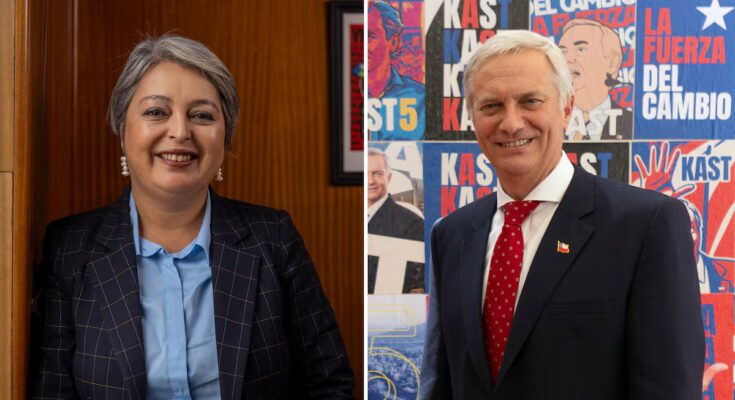The next president of Chile, who will govern the South American country between 2026 and 2030, will be the communist candidate Jeannette Jara or the far-right representative José Antonio Kast, leader of the Republican Party. The Chileans decided this on Sunday, after the first round of the presidential elections in which voting was compulsory for the first time.
With 99% of the votes counted, Jara, the candidate of President Gabriel Boric’s administration, received 26.8% of the vote, well below what the polls had predicted. Kast came in second with 23.9%, a narrow margin that makes him the favorite to win as conservative forces collectively secured majority support.
In a surprise result, the third most voted candidate was right-wing populist Franco Parisi, who won 19.7% of the vote in his third attempt to come to power. In doing so, he emerged ahead of both the radical libertarian Johannes Kaiser, who got 13.9%, and the big loser of the day, the mainstream conservative Evelyn Matthei, who came fifth (12.4%), in what amounts to a major failure for the Chile Vamos coalition.
“I congratulate Jeannette Jara and José Antonio Kast for having advanced to the second round,” said President Boric, speaking from the Moneda Palace, flanked by his Interior Minister, Álvaro Elizalde, and his spokeswoman, Camila Vallejo.
The results, in which right-wing forces collectively hold a significant majority, coincide with the scenario repeatedly shown in polls: on December 14, the approximately 15.7 million voters required by law to vote will have to choose Boric’s successor between two extremes of the political spectrum.
Although the left-wing Jara party came first, the combined votes for Kast, Kaiser and Matthei amounted to 52.23%, giving Kast a strong position for the run-off. If the support of Parisi, a populist and opponent of Boric, were added, the total would be brought to 70.64%, even if there is no evidence that Parisi’s voters will automatically move to the right in the runoff. On Sunday evening Parisi refused to support one of the two presidential candidates: “I have bad news for the candidates: earn your votes.”
The difference between Jara and Kast, of about three percentage points, was not what the left had hoped for. Polls had consistently shown that the 51-year-old public administrator would garner the most support on November 16, but by a margin of between five and nine points over Kast. Its main challenge was not to win this first round – the governing coalition had rallied around Jara’s candidacy – but rather to secure a majority that would allow it to win the December 14 runoff.
Suspension of membership in the Communist Party
According to polls, which have generally provided accurate projections, Jara would lose to Kast, a 59-year-old lawyer, especially by such a narrow margin over the Republican nominee. Therefore, he must start sending strong signals to the moderate electorate. The first expected action is for Jara to suspend or freeze her membership in the Communist Party, where she has been a member since she was 14, a move that is already arousing considerable resistance. Furthermore, a change is expected in his team, with the inclusion of figures who can reassure the political centre.
As expected, Kast overtook Parisi, Matthei and Kaiser. This is the third time the far-right candidate is running for president. In the 2021 elections, he won the first round but lost the runoff to Boric, the current president. A conservative speaker on issues such as abortion, Kast has promised an “emergency government” for Chile with priorities focused on security, economic growth, streamlining state administration – he intends to cut $6 billion in spending over 18 months – and irregular immigration.
Kast already has the expressed support of Kaiser, with whom he has made a joint electoral pact for the Congress, and that of Mattei, who went to visit him at his headquarters. Kast will also be joined by many exponents of the traditional right, grouped in the Chile Vamos coalition. The pragmatic right is expected to join forces to prevent Jara from coming to power on March 11, when Boric leaves government having just turned 40.
The signals that the two candidates will send in the next few hours will be fundamental to obtaining further support. Jara was not even able to reach the historic support enjoyed by the Boric government, a loyal 30%, but insufficient to obtain a majority. During the electoral campaign, in fact, she distanced herself from the president and his administration, despite the fact that she herself was Minister of Labor until a few months ago. Jara’s mission is monumental, because the political winds in Chile are currently blowing in favor of the right like never before and, as has been the case for the last 20 years, presidential elections are being won by the opposition bloc.
Volatile voters
In Chile, elections once again took place as smoothly as they have since the return of democracy in 1990. In addition to electing Boric’s successor, voters renewed the entire Chamber of Deputies (155 members) and almost half of the Senate (23 of the 50 senators from seven regions, excluding the capital district). It is the first time since 1990 that citizens have elected the President of the Republic with compulsory voting and automatic voter registration.
Chilean society has been unstable in its electoral preferences. After the social uprising of 2019, with unprecedented waves of violence that brought the government of moderate right-wing president Sebastián Piñera to its knees, voters approved a constitutional path to replace Augusto Pinochet’s 1980 Constitution, which however bears the signature of socialist president Ricardo Lagos due to the reforms made in 2005.
Then they elected a drafting body dominated by the far left and, when President Boric’s government had been in office for just six months, they rejected the text supported by the governing coalition by a vote of 62% to 38%. It was a resounding failure that forced the government to adapt to new circumstances and curb the high expectations with which it took office in March 2022. Subsequently, a second process was opened to prepare a new Constitution, to which drafters, mainly from the far right, contributed significantly, but in 2023 Chileans again rejected the proposal by a percentage of 55% to 42%.
This is what is known as the Chilean pendulum. The decisions seem contradictory, but they are not: society remains angry and, above all, deeply disillusioned with political institutions. Therefore, for two decades they have punished the rulers and favored the opposition, as if trying to believe in change, which never really comes. Governments, in turn, have to deal with a fragmented Congress and have serious problems securing a majority and approving laws. Chileans, who trust neither the government, nor the parties, nor the parliament, reluctantly participated in the elections in which, for the first time, their vote was compulsory. Polls show that Chileans were more worried than hopeful about this election, and that more than half agreed with the statement: “No matter who is in government, I will still have to go to work every day.”
This is the Chile that will inherit its next president in four months, when he takes office on March 11. A country with a fickle electorate that does not maintain its support for long and which fears above all the emergence of transnational organized crime. This is part of the social landscape that explains why prevailing winds push for extreme rhetoric like Kast’s and, as a result, the difficulties faced by the left.
Sign up to our weekly newsletter to get more English-language news coverage from EL PAÍS USA Edition



